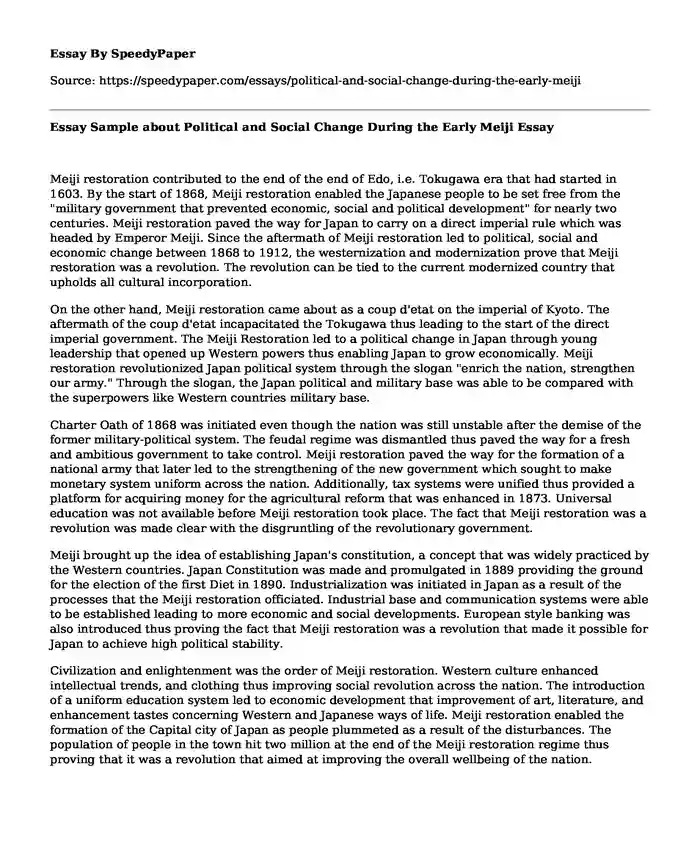Meiji restoration contributed to the end of the end of Edo, i.e. Tokugawa era that had started in 1603. By the start of 1868, Meiji restoration enabled the Japanese people to be set free from the "military government that prevented economic, social and political development" for nearly two centuries. Meiji restoration paved the way for Japan to carry on a direct imperial rule which was headed by Emperor Meiji. Since the aftermath of Meiji restoration led to political, social and economic change between 1868 to 1912, the westernization and modernization prove that Meiji restoration was a revolution. The revolution can be tied to the current modernized country that upholds all cultural incorporation.
On the other hand, Meiji restoration came about as a coup d'etat on the imperial of Kyoto. The aftermath of the coup d'etat incapacitated the Tokugawa thus leading to the start of the direct imperial government. The Meiji Restoration led to a political change in Japan through young leadership that opened up Western powers thus enabling Japan to grow economically. Meiji restoration revolutionized Japan political system through the slogan "enrich the nation, strengthen our army." Through the slogan, the Japan political and military base was able to be compared with the superpowers like Western countries military base.
Charter Oath of 1868 was initiated even though the nation was still unstable after the demise of the former military-political system. The feudal regime was dismantled thus paved the way for a fresh and ambitious government to take control. Meiji restoration paved the way for the formation of a national army that later led to the strengthening of the new government which sought to make monetary system uniform across the nation. Additionally, tax systems were unified thus provided a platform for acquiring money for the agricultural reform that was enhanced in 1873. Universal education was not available before Meiji restoration took place. The fact that Meiji restoration was a revolution was made clear with the disgruntling of the revolutionary government.
Meiji brought up the idea of establishing Japan's constitution, a concept that was widely practiced by the Western countries. Japan Constitution was made and promulgated in 1889 providing the ground for the election of the first Diet in 1890. Industrialization was initiated in Japan as a result of the processes that the Meiji restoration officiated. Industrial base and communication systems were able to be established leading to more economic and social developments. European style banking was also introduced thus proving the fact that Meiji restoration was a revolution that made it possible for Japan to achieve high political stability.
Civilization and enlightenment was the order of Meiji restoration. Western culture enhanced intellectual trends, and clothing thus improving social revolution across the nation. The introduction of a uniform education system led to economic development that improvement of art, literature, and enhancement tastes concerning Western and Japanese ways of life. Meiji restoration enabled the formation of the Capital city of Japan as people plummeted as a result of the disturbances. The population of people in the town hit two million at the end of the Meiji restoration regime thus proving that it was a revolution that aimed at improving the overall wellbeing of the nation.
Bibliography
Ward, Robert E., and Dankwart A. Rustow, eds. Political modernization in Japan and Turkey. Princeton University Press, 2015.
Editors of Encyclopedia Britannica. Meiji Restoration: Japanese History. Retrieved from https://www.britannica.com/event/Meiji-Restoration
Shively, Donald H., ed. Tradition and modernization in Japanese culture. Vol. 4814. Princeton University Press, 2015.
Iriye, Akira. Japan and the wider world: from the mid-nineteenth century to the present. Routledge, 2014.
Cite this page
Essay Sample about Political and Social Change During the Early Meiji. (2022, Aug 26). Retrieved from https://speedypaper.com/essays/political-and-social-change-during-the-early-meiji
Request Removal
If you are the original author of this essay and no longer wish to have it published on the SpeedyPaper website, please click below to request its removal:
- Essay Example on the Dental Materials Experiment
- New Product Development Essay Sample
- Free Essay on A Beautiful Mind: A Psychological Theory Perspective
- Law Essay Sample: Declaratory Judgment, Counterclaim, Shrink-Wrap License
- Essay Example on Economic Interdependence
- Free Essay Example: Supreme Court Side With Baker
- Essay Example - Sociological Perspective of the Family
Popular categories





